
In Lesson 2 you will focus on three noun cases which are relevant to the theme of this Unit: Знахідний, Місцевий, Кличний.
Але ж він... Does he ever... Is he ever...
|
Іменники: Місцевий відмінок
|
The Locative Case may be used to indicate one’s location in the house.
Чоловічий рід (inanimate)
Consonant --- і : коридор - Мама в коридорі.
Жіночий рід
| a --- і |
ванна |
Тарас у ванні. |
| я --- і |
спальня |
Оленка у спальні. |
| ка --- ці |
лазничка |
Тато в лазничці. |
Середній рід
| о --- і |
крісло |
Леся на кріслі. |
 |
У тексті Мама варить ми чуємо: |
| Я тут, у кухні. |
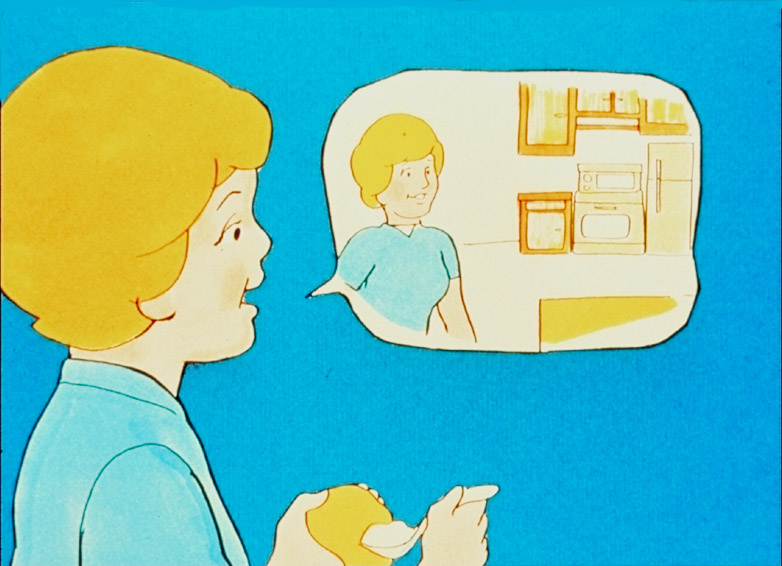 |
|
Вони там, у вітальні.
|
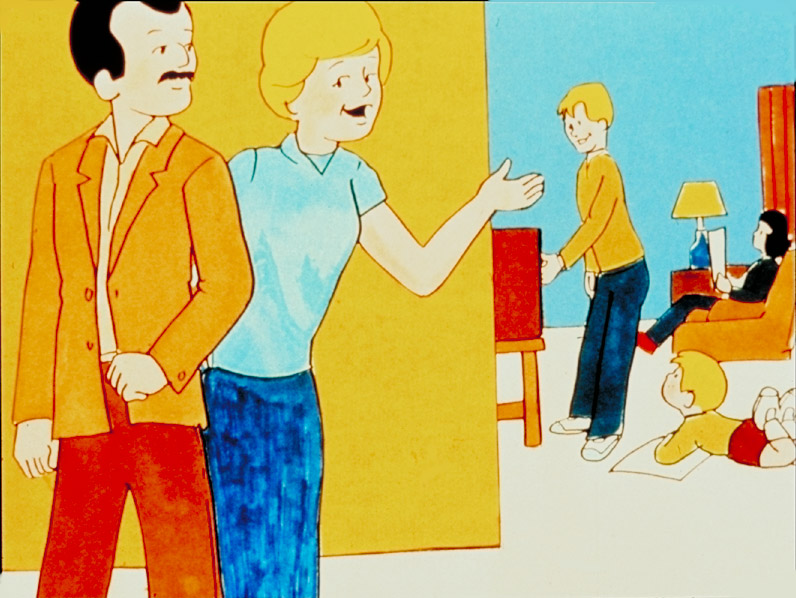 |
|
 |
У тексті Вечеря ми чуємо: |
Він спить у спальні.
|
 |
|
XII. Exercise 2.i
Which questioning word is used to create questions in the Locative Case? Compose questions in the space given.
1. Мама в коридорі. ________________________________________
2. Тарас у ванні. _________________________________________
3. Оленка у спальні. _______________________________________
4. Тато в лазничці. _______________________________________
5. Леся на кріслі. _________________________________________
6. Він спить у спальні. ____________________________________
7. Вони в їдальні. ________________________________________
8. Діти у вітальні. _______________________________________
Кімнати в хаті
Five Ukrainian words for rooms (кімнати) in a house are shown below. The word for hallway, or corridor, is a cognate.
спальня |
|
кухня |
|
їдальня |
|
|
|
|
|
|
|
|
|
|
вітальня |
|
лазничка* |
|
коридор |
|
|
|
|
|
* see Cultural Notes
 Cultural Notes: The Bathroom Cultural Notes: The Bathroom
In Ukrainian, much like English, the word bathroom has many variations (bathroom, washroom, powder room, ladies’/men's room, rest room, water closet) depending on where you live. Ukrainian terms which you may hear include: лазничка, умивальня, ванна, туалет. It is important to understand the context of these terms, especially if you plan to travel to other countries in the future.
a) лазничка and умивальня (вмивальня) are Canadian Ukrainian preferences and literally mean “a room where you can wash up”. This is because most Canadian homes have a sink, bathtub, shower and a toilet all in one room. The course e-mova: Core Ukrainian 20 uses these two terms.
b) ванна means bathtub as well as bathroom in Ukrainian. The room contains a sink, a tub and possibly a shower. This is common in many European countries. In England, the washroom is actually called the ‘water closet’ (WC).
c) туалет means the toilet room (borrowed from the French word toilette) and is separate from the washroom in many European homes.
XII. Exercise 2.ii
Answer the questions below in full sentences.
1. |
Де можна варити?
|
|
_________________________________________________________
|
2. |
Де можна спати?
|
|
_________________________________________________________
|
3. |
Де можна писати листи?
|
|
_________________________________________________________
|
4. |
Де можна обідати?
|
|
_________________________________________________________
|
5. |
Де можна робити домашню роботу?
|
|
_________________________________________________________
|
6. |
Де можна читати?
|
|
_________________________________________________________
|
7. |
Де можна снідати?
|
|
_________________________________________________________
|
8. |
Де можна грати в карти?
|
|
_________________________________________________________
|
9. |
Де можна розмовляти при телефоні?
|
|
_________________________________________________________
|
10. |
Де можна вечеряти?
|
|
_________________________________________________________ |
|
Іменники: Знахідний відмінок
|
We will turn our attention to the objects which we would commonly see in the rooms of a house. Recall that affirmative verbs are usually followed by the Accusative Case. The pattern is as follows:
Masculine nouns - no change
Feminine nouns - а changes to у; я changes to ю
Neuter nouns - no change.
Note the following sentence:
I have a couch, a lamp and a television set in the living room.
Я маю диван, лямпу і телевізор у вітальні.
The cases for the words which appear in bold are as follows:
Знахідний відмінок: диван, лямпа, телевізор
Місцевий відмінок: вітальня
XII. Exercise 2.iii.
Part 1: Check the meaning of the following nouns in your dictionary:
1. ліжко __________________________________
2. телевізор __________________________________
3. плита (піч) __________________________________
4. стіл __________________________________
5. пилосос __________________________________
6. шафа __________________________________
7. диван __________________________________
8. дзеркало __________________________________
9. крісло __________________________________
10. радіо __________________________________
Part 2: Use these nouns in a sentence following the pattern given below.
Знахідний Відмінок + Місцевий Відмінок
Я бачу ________________ у/в ______________________:
1. ліжко/спальня ________________________________________________
2. телевізор/вітальня______________________________________________
3. плита/кухня ________________________________________________
4. стіл/кухня _____________________________________________________
5. пилосос/коридор_______________________________________________
6. шафа/спальня ________________________________________________
7. диван/ вітальня ________________________________________________
8. дзеркало/ванна ________________________________________________
9. крісло/вітальня ________________________________________________
10. радіо/спальня ________________________________________________
Меблі в хаті
In order to help you to remember the names of some furniture and household items, categorize the new words given below by placing them beside the appropriate pictures. Feel free to add other furniture or household items to the list. Use a dictionary to look up the meanings of those words which are still unfamiliar to you. (You may use words more than once.)
ліжко, телевізор, плита, стіл, серветка, пилосос, шафа, диван, дзеркало, крісло, радіо,
туалет, вікно, ванна, двері, холодильник, умивальник, душ,
піч, картина, світло, миска,
годинник, тарілкa, столик, вазонок, горнятко
|
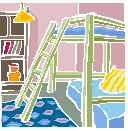 |
|
1. _______________
2. _______________
3. _______________
4. _______________
5. _______________
6. _______________
|
|
 |
|
1. _______________
2. _______________
3. _______________
4. _______________
5. _______________
6. _______________
|
|
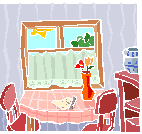 |
|
1. _______________
2. _______________
3. _______________
4. _______________
5. _______________
6. _______________
|
|
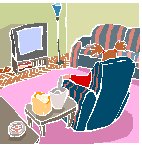 |
|
1. _______________
2. _______________
3. _______________
4. _______________
5. _______________
6. _______________ |
|
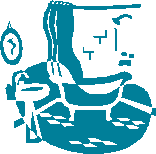 |
|
1. _______________
2. _______________
3. _______________
4. _______________
5. _______________
6. _______________
|
|
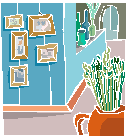 |
|
1. _______________
2. _______________
3. _______________
4. _______________
5. _______________
6. _______________ |
|
XII. Exercise 2.iii Answer in complete sentences.
1. |
Де ліжко? |
____________________________________________
|
2. |
Де телевізор? |
____________________________________________
|
3. |
Де масло? |
____________________________________________
|
4. |
Де плита? |
____________________________________________
|
5. |
Де стіл? |
____________________________________________
|
6. |
Де пилосос? |
____________________________________________
|
7. |
Де шафа? |
____________________________________________
|
8. |
Де диван? |
____________________________________________
|
9. |
Де молоко? |
____________________________________________
|
10. |
Де дзеркало? |
____________________________________________
|
11. |
Де крісло? |
____________________________________________
|
12. |
Де радіо? |
____________________________________________
|
XII. Exercise 2.iv
Describe the rooms of your home.
_____________________________________________________________________
_____________________________________________________________________
_____________________________________________________________________
_____________________________________________________________________
_____________________________________________________________________
|
Відмінки: Орудний відмінок
|
You will recall that the Instrumental case is used after the preposition з. Note the changes in endings of nouns as summarized below.
Чоловічий рід (inanimate)
consonant --- ом: (хліб) Я люблю м’ясо з хлібом.
й --- єм: (чай) Я люблю мед з чаєм.
щ --- ем: (борщ) Я люблю хліб з борщем.
Жіночий рід
а --- ою: (салата) Я люблю огірок зі салатою.
я --- ею: (Таня) Я люблю танцювати з Танею.
Середній рід
о --- ом: (масло) Я люблю хліб з маслом.
е --- ем: (яйце) Я люблю перець з яйцем.
XII. Exercise 2.v
Complete the exercise by supplying words in the Instrumental Case.
м'ясо |
> |
з м'ясом |
|
сир |
> |
з сиром |
яблуко |
> |
з яблуком |
|
мед |
> |
з медом |
масло |
> |
з маслом |
|
помідор |
> |
з помідором |
яйце |
> |
з яйцем |
|
борщ |
> |
з борщем |
морозиво |
> |
з морозивом |
|
чай |
> |
з чаєм |
|
|
|
|
|
|
|
|
ковбаса |
> |
з ковбасою |
|
|
цибуля |
> |
з цибулею |
|
|
фасоля |
> |
з фасолею |
|
|
риба |
> |
з рибою |
|
|
грушка |
> |
з грушкою |
|
|
капуста |
> |
з капустою
|
|
|
1. |
Іван хоче їсти хліб з (butter) маслом.
|
2. |
Тарас хоче їсти хліб з (sausage) _______________________________.
|
3. |
Богдан хоче їсти хліб з (ice cream) _______________________________.
|
4. |
Степан хоче їсти хліб з (honey) _______________________________.
|
5. |
Мирон хоче їсти хліб з (meat) _______________________________.
|
6. |
Борис хоче їсти хліб з (tomato) _______________________________.
|
7. |
Василь хоче їсти хліб з (egg) _______________________________.
|
8. |
Ігор хоче їсти хліб з (fish) _______________________________.
|
9. |
Петро хоче їсти хліб з (onion) _______________________________.
|
10. |
Антон хоче їсти хліб з (borshch)_______________________________.
|
11. |
Михайло хоче їсти хліб з (beans)_______________________________.
|
12. |
Володимир хоче їсти хліб з(cabbage) _______________________________.
|
13. |
Андрій хоче їсти хліб з (pear)_______________________________.
|
14. |
Максим хоче їсти хліб з (apple) _______________________________.
|
15. |
Петрик хоче їсти хліб з (tea) _______________________________.
|
|












 Cultural Notes: The Bathroom
Cultural Notes: The Bathroom